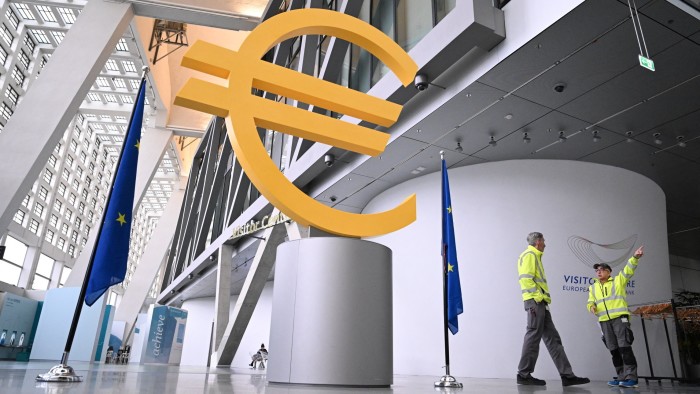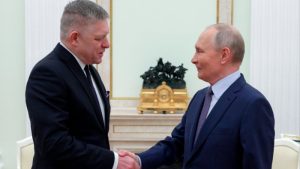The ECB cannot pretend any technocratic purity

Unlock the Editor’s Digest for free
Roula Khalaf, Editor of the FT, selects her favourite stories in this weekly newsletter.
There is a reason why coins have, for millennia, carried the likenesses of rulers: controlling the supply of legal tender is a pouvoir régalien — a power at the core of statecraft and geopolitical influence. Nowadays, however, the power of the mint is largely hoarded by independent technocratic central banks with narrow, often legalistic mandates — and even narrower mindsets.
As the EU steps into a newly geopolitical age, it ought to consider how the European Central Bank should support its strategic posture. On Thursday, ECB president Christine Lagarde implicitly passed the buck: “Everybody has to do their job . . . the central bank cannot be a jack of all trades. We have to do our job, which is . . . price stability.”
Indeed it is. But from the point of view of statecraft, it is too narrow to see inflation-fighting as central banks’ only job. That is especially true for the ECB, whose legal foundation explicitly gives it two mandates. First, price stability, and second — so long as it does not undermine the first — support for the general economic policies of the EU.
Far too little attention is paid to the ECB’s secondary mandate and — in other jurisdictions too — how the many tools of central banks could be wielded in the pursuit of broader policy objectives. When European elected leaders agonise over how to mobilise the private investment all agree is needed in digital, green tech and defence-related manufacturing, it is irresponsible to maintain a taboo on the role of central banks in those agendas.
Central banks already pursue many objectives beyond price stability. Most have a role in financial regulation. The ECB has some responsibility for the international role of the euro. And in its impressive work on a digital currency, it does take seriously the geopolitical dimensions of money — while rightly waiting for elected politicians to take decisions only they can take. It could with benefit impress the geopolitical stakes on them more strongly.
The economic theory underpinning technocratic central bank independence does not generalise to other policy areas. We have delegated monetary policy to technocrats because of the futility of trying to spring inflation surprises on private economic agents. It does not follow that central bank action and political objectives must be kept apart for all other issues too.
What would it look like for the ECB to contribute more actively to the EU’s geopolitical priorities? Those priorities recognise an imperative to shift more resources into capital investment in certain sectors — as set out in the broadly supported Draghi report, for instance. The allocation of capital is something central banks cannot help but influence — but they universally pretend to adopt a stance of neutrality towards it.
One alternative would be targeted lending. In the past, the ECB’s “targeted long-term repurchasing operations” instrument offered banks funding below the normal policy rate to the extent they boosted business lending (it mimicked the earlier policy of “funding for lending” by the Bank of England). An updated version could offer similar incentives to banks expanding their loans to the sectors designated as strategic by the Eurozone’s democratically elected leaders — be that for decarbonisation, digital innovation or defence-adjacent infrastructure — without picking individual winners.
Such a dual-rate system — especially with a commitment to keeping the targeted rate low — would shift capital flows towards the priority sectors chosen by governments. If such incentives made demand excessively inflationary in the aggregate, the main policy rate would be adjusted up accordingly. That would reduce activity in non-priority sectors — but that is the resource reallocation democratically stated priorities require.
Sanctions policy is another area central banks play a part in. In the debate over whether to seize blocked Russian foreign exchange reserves to enforce Moscow’s compensation obligations to Ukraine, the ECB has chosen to put up strong resistance. But its mandate is to support the EU’s policy, not to shape it.
A case in point: Saudi Arabia and China have reportedly threatened to dump French sovereign bonds if Paris supports seizing Moscow’s reserves. It is up to French and other EU leaders to choose how to respond. But the ECB has a “transmission protection instrument” dedicated to preventing Eurozone government funding crises for non-economic reasons. It should publicly state its readiness to wield TPI against any politically motivated attack on sovereign bonds, increasing governments’ room for manoeuvre. In its supervisory capacity, it could also order the segregation into separate vehicles of Moscow’s blocked reserves in Euroclear Bank and other Eurozone banks.
Any of this would need to be democratically anchored. But the greater risk is to choose helplessness and ignore central banks’ geopolitical capabilities altogether.
#ECB #pretend #technocratic #purity




